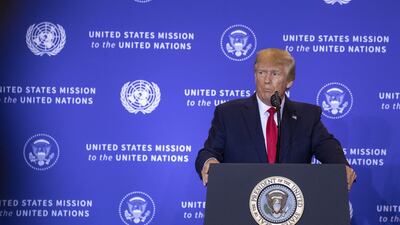US Speaker of the House Nancy Pelosi’s explosive announcement of an impeachment inquiry into claims that President Donald Trump abused his power could further impede his foreign policy agenda.
The inquiry was announced on Tuesday and now has the support of 217 Democrats, NBC reported, one short of a majority to impeach.
Mr Trump has been accused of pressuring Ukrainian President Volodymyr Zelenskiy into investigating claims against former vice president Joe Biden, who is now a leading Democrat presidential contender.
It promises a months-long battle, with subpoenas flowing between Mr Trump and his opponents.
But experts say it will distract an already frantic president as far as foreign policy is concerned, and could backlash on US relations with Ukraine.
The distraction has already begun in New York, as Mr Trump’s focus at the UN General Assembly shifted from foreign policy into tweeting about the “witch hunt”, and a five-page memo that the White House released that details his July 25 call with Mr Zelenskiy.
Aaron Miller a senior fellow at the Carnegie Endowment for International Peace, who served for 25 years in the US government, said the inquiry would rattle and distract Mr Trump.
“Impeachment causes presidential distraction,” Mr Miller told The National. “I saw it first-hand under Bill Clinton.”
He expected that it would make Mr Trump more “angry, mercurial and consumed with attacking his political adversaries”.
Richard Nixon resigned after Watergate but managed to end fighting in the Middle East with agreements brokered by his secretary of state, Henry Kissinger.
Mr Miller said that Donald Trump “doesn’t have a Henry Kissinger.”
But he did not anticipate radical changes in the Middle East agenda given other complexities at hand.
Mark Schmitt the head of the political reform program at New America, said while “impeachment is a distraction from all the work of the presidency, Mr Trump has never been focused enough that that would matter or affect him”.
“In theory, a president facing impeachment would have to spend a lot of time working on his or her defence, meeting with lawyers,” Mr Schmitt said.
“But Mr Trump seems to welcome distractions that involve a fight. He’s undisciplined with his time, so the impeachment process isn’t likely to change much.”
Another area where impeachment could hurt US foreign policy is relations with Ukraine, said Michael Weiss, of the Institute for Strategic Dialogue.
“It may affect US-Ukrainian relations, where Democrats will see in Mr Zelenskiy’s phone call with Donald Trump a Ukrainian leader who is just as corrupt as his predecessors, who now has the added value of seeming willing to conspire with Trump to derail a Biden candidacy,” Mr Weiss said.
“If the impeachment inquiry flounders, or even if it doesn’t, they [Democrats] may take it out on Ukraine.”
But Ken Gude, a legal analyst in Washington said the inquiry damages Mr Trump’s ability to do business with other foreign leaders.
“President Trump’s ability to conduct foreign policy has been severely constrained by the revelations that he was pressuring a foreign country to help him harm a domestic political opponent,” Mr Gude said.
“Few countries, if any, will want to risk getting caught up in that type of scandal.”
“Many will likely view him with scepticism and refrain from substantial engagement. This leaves America weaker and more isolated. This leaves America weaker and more isolated.”
The House has in the past launched impeachment inquiries for presidents Andrew Johnson, Bill Clinton and Richard Nixon. Mr Trump’s is the fourth.

